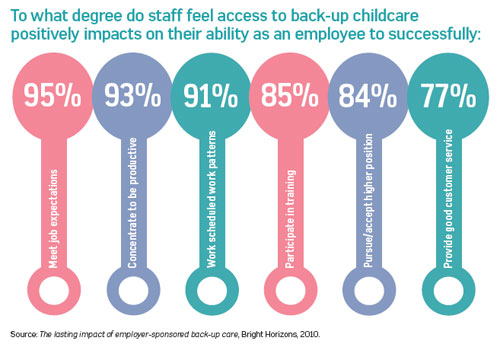Employers have no legal obligation to provide emergency childcare for working parents, but it can be to their advantage to do so.
IF YOU READ NOTHING ELSE, READ THIS…
- There is no legal obligation for employers to provide emergency childcare to employees.
- A range of emergency childcare options is available to parents in the workplace, but their suitability depends on the employer’s budgets and the employees’ needs.
- One of the biggest benefits of operating a workplace nursery is the tax and national insurance relief available to employers that meet HM Revenue and Customs criteria.
More than 10 million children in the UK live in working households, according to the Office for National Statistics’ Working and workless households 2012 report, published in August, so employers will be faced with staff needing help to balance their caring responsibilities and working life, especially in unforeseen circumstances.
Employers have no legal obligation to provide emergency childcare. Sheila Fahy, professional support lawyer at law firm Allen and Overy, says: “The only obligations are to provide reasonable time off to deal with an unexpected disruption in care arrangements or a sick child. The time off is unpaid and would usually last no more than a day or two.”
However, emergency childcare services can be beneficial for both employers and staff. Not only can these enable employees to return to work, or work from home, more easily, but they can also be a recruitment and retention tool.
In a report published by childcare provider Bright Horizons in 2010, The lasting impact of employer-sponsored back-up care, 95% of respondents said back-up childcare meant they were able to do their job and 93% said it enabled them to concentrate on their work.
Sarah Boddey, head of diversity and inclusion at Barclays Wealth and Investment Management, which launched an emergency childcare service through My Family Care in June 2011, says: “We were finding that if staff have lots of notice about the need to arrange childcare, most could do so. It was in last-minute situations, such as when a child is sick or the nanny cannot come to work, when finding reliable back-up care is difficult. About 90% of the time, the parent or carer would have to take the day off work to deal with it.”
A range of emergency childcare options is available to support parents in the workplace, but their suitability depends on the employer’s budget and the employees’ needs.
Employers that are keen to support staff but lack a budget to fund a dedicated service could consider linking up with local nurseries to promote their services.
Low-cost options
Other low-cost options are online childcare directories, which charge a small monthly fee for access to listings of nurseries and nanny agencies staff can contact in an emergency.
Employers with a dedicated childcare budget might consider an in-house childcare service, such as a crèche or nursery. One of the biggest benefits of a workplace nursery is the tax and national insurance relief available to employers meeting HM Revenue and Customs (HMRC) criteria. These include nurseries meeting the registration requirements of Ofsted or those of any relevant devolved authority, and for nursery places to be offered in a scheme that is open to all employees.
Employers could also consider funding places at local nurseries for use by staff on a first-come, first-served basis in an emergency. An employer-funded arrangement of this kind can also be exempt from tax and NI contributions if it meets HMRC criteria.
Employers can source places directly with nurseries or via a provider with links to nursery chains. Providers can also arrange nanny and childminder services in employees’ homes.
Emergency childcare can be funded in various ways, including salary sacrifice arrangements and childcare vouchers. Some employers will provide a number of free sessions at a nursery or with a childminder.
Employers are now also wrapping their emergency childcare in wider programmes, which include cover for school holidays and elder and adult care provisions.
Ben Black, director at provider My Family Care, says: “About half our bookings for the last 30 days are for emergencies, while the other half are much more planned. When school holidays come up, staff can get stressed about how they are going to manage childcare.”
Many employers are now also providing elder and adult care in their back-up schemes.
Carole Edmond, managing director at Bright Horizons, says: “The biggest trend [in care] is awareness of the changing demographic and our ageing population, and the impact that will have on people with caring responsibilities.”
Viewpoint

Julian Foster,
managing director, Computershare Voucher Services
Were you woken up this morning by a phone call from the childminder, who has gone down with the flu? Or perhaps your child’s nursery has had to close because the drains need work, or your parents have decided to go on a last-minute cruise for a break from their grandparenting duties?
There can be various reasons why childcare arrangements can break down. Parents do not want to let their employer down, but if their childcare fails at the last minute, they may feel their only option is to use annual leave or work from home. Emergency childcare can be a solution.
Childcare vouchers, which staff can buy via a salary sacrifice scheme, can be used to pay for all types of registered childcare and so can be useful when emergency care is needed. Using vouchers helps parents find the money to pay for unexpected childcare at the last minute.
Parents should use e-vouchers rather than paper vouchers to make it easier to switch payments. They can manage their account with their voucher provider online, including which carer is paid and how much, so if they need to swap carers in an emergency situation, it is covered.
Employers can help working parents to access emergency childcare by publishing a list of Ofsted-registered local nurseries and childminders on their intranet.
Where possible, employers should also look at initiating family-friendly policies across the workplace, such as an in-house crèche or flexitime.
CASE STUDY: NORTHERN TRUST

Emergency cover pays off with employee engagement
Financial services provider Northern Trust launched a back-up care service for its UK staff in August this year. About 150 employees have signed up to the service, which is provided by My Family Care and includes emergency childcare, school holiday cover, and elder and adult care.
Childcare support is in the form of childminders, nannies and nursery places. The company funds six sessions of care for each employee annually.
Cara Collins, vicepresident, senior employee resources consultant at Northern Trust, says: “In our focus on employee engagement, it is our aim to have a workforce that is motivated, productive and energised. We hope that by supporting our employees through stressful situations like childcare emergencies it will help them better manage the balance between work and life, and have a positive impact on their engagement.”

STATISTICS
10 million children live in working households
Source: Working and workless households 2012, Office for National Statistics, August 2012.
49% of workers used back-up care because of an unexpected breakdown in care
Source: The lasting impact of employer-sponsored back-up care, Bright Horizons, 2010.